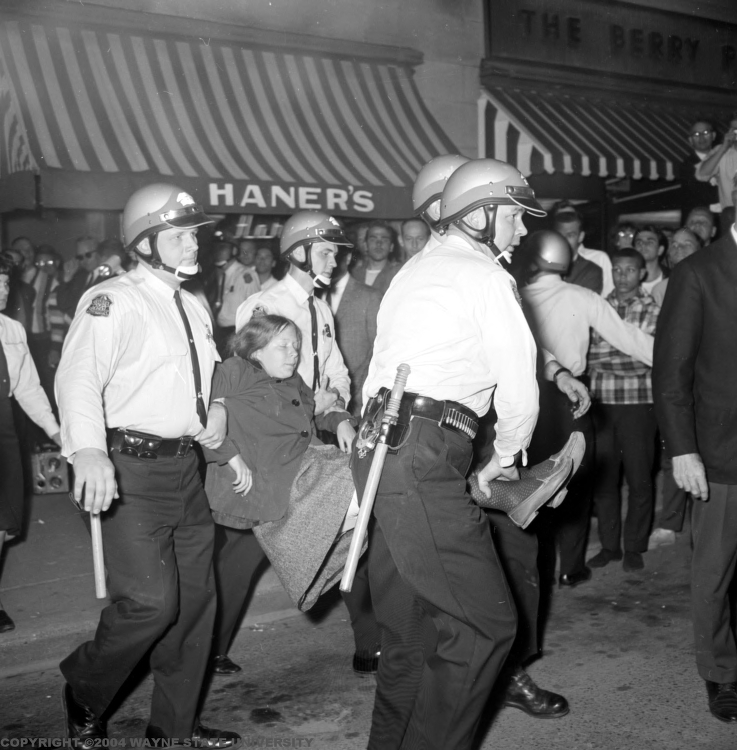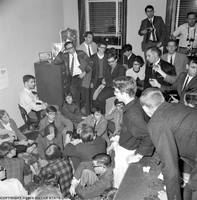The Selective Service Office Sit-In (October 1965)
Another protest, organized by the VOICE Chapter of SDS at University of Michigan, occurred on the International Days of protest. Thirty nine people, mostly students from the University of Michigan, planned a sit-in at the Local Board 85 Ann Arbor Selective Service Office. Wendell Hulcher, the Mayor of Ann Arbor at the time, said “if civil disobedience is practiced… I ask that the police act to enforce our laws.” A document titled “Instructions for Civil Disobedience” from SDS set several steps that should be taken by the people participating in the Selective Service Office Sit-In. A couple of the most important steps were: “this will be a nonviolent demonstration,” “the group has the services of a lawyer who will defend clients who plead guilty to the charges,” and “everyone will be bailed out Saturday evening.” The documents unveils that these participants were aware of possible arrest and jail time.
The Anti-Draft Sit-in
Before the sit-in, the SDS activists held a vigil on the Diag, followed by a rally, and then a march to the Selective Service Office in downtown Ann Arbor. While some picketed outside, other activists sat on the floor of the office singing songs about freedom and ending the war. They were warned that if they did not leave the when the office closed, they would be arrested. The demonstrators would not leave and therefore were arrested by Ann Arbor Police. Thirty-six of the thirty-nine received a ten day jail sentence and a fine of sixty-five dollars per person. Local Draft Boards were given the power to determine whether protesters should be reclassified for defying the Selective Service Act. Thirteen students received draft reclassifications as a result. General Hershey, head of the Selective Service System, claimed that the students broke the Selective Service Act and were convicted without a court ruling. Hershey stated that draft boards should be able to punish student demonstrators to prevent other students from committing similar a similar offense, “the government would be committing suicide if it deferred students who defied the Selective Service System.”
Stance of ACLU: Reclassification Impedes Upon Civil Liberties
The American Civil Liberties Union, or ACLU, recognized the reclassifications as unconstitutional and helped students appeal to higher courts. These cases sparked an attack on unlawful procedures that were occurring within the Selective Service System. ACLU State Chairman Rolland O’Hare noted, “until now no one...has suggested that the Selective Service Act may be used as a device to punish dissent.” Eric Chester, a student who received reclassification remarked, “these cases should also be viewed as part of the growing erosion of civil liberties in America which is itself a symptom of a society based on a foreign policy of aggression and an internal economy dependent on producing war materials.” Government agencies continued to punish dissenters of the war in order to discourage acts of “civil disobedience.”
Stance of Selective Service: Constitutional Decision
When interviewed by the Michigan Daily, Hershey commented on his decision to punish civil disobedience with, “I’m one of those old-fashioned fathers who never let pity interfere with a spanking.” Hershey received backlash from the University President Harlan Hatcher who expressed that “the draft not be used as a punitive measure” as it could degrade the concept of the draft. Richard Cutler reiterated Hatcher because it seems “to be a question open to determination by due process not by a blanket judgment of a selective service official,” and that “the Selective Service System is treading on dangerous ground when it opens itself to the possible charge of the use of the Universal Military Training and Service Act as a tool of reprisal for political activity.” Although the University of Michigan administration, as well as Ann Arbor officials, had mixed opinions on earlier events such as the International Days of Protest or the teach-in, the University supported the students at the time.
Stance of the University: Selective Service Used Discrimination
On December 1, 1965, the University issued a statement concerning the students who received reclassification, “satisfactory educational progress by the student is in our judgement the controlling, if not the sole factor upon which deferment should be based. This we understand to be the existing national policy.To introduce other factors into the decision makes possible either individual favoritism or individual punitive action, either of which is clearly unwise and potentially discriminatory.”
Jailed Students Express Their Views
The students were convicted by Municipal Court for violating local trespassing ordinance. Bill Ayers, a student who received jail time for his participation in the sit-in, recounted his time in jail his conviction in “All American Jail” as well as his memoir, “Fugitive Days”. Ayers’ expected hostility towards the war and draft, but prisoners were open to talk about it with one young man discussing how he dodged the draft since he doesn’t like “what’s going on over there.” Ayers’ recounted that the sole backlash he received was from the police. During his time in jail, Bill defended his actions at the Selective Service Sit-In and involvement with SDS by saying, “What are you doing to end the war? I challenged. We may not be doing everything right, but at least we’re against the war and we’re acting on our beliefs”.
Citations for this page (individual document citations are at the full document links).
1. Eric Chester, “History of the Ann Arbor Sit-in”, January 28th, 1966, SDS New Left Notes Vol. 1, No. 2
2. Charlotte A. Wolter, “Jail ‘U’ Students, Teaching Fellows in Draft Board Civil Disobedience”, October 16, 1965, Michigan Daily Fall 1965, Bentley Historical Library, University of Michigan
3. "Instructions for Civil Disobedience," Vietnam Teach-In Miscellaneous, Box #5, J. Edgar Edwards Papers, Bentley Historical Library, University of Michigan.
4. "Sit-In and Draft Board Reclassification," Mimeographed handouts of various activist groups in Michigan, Michael Zweig Papers, Bentley Historical Library, University of Michigan.
5. Robert Moore, “Hatcher, Draft Officials Conflict on Demonstrations: Cutler Says Courts Just Judge Acts,” The Michigan Daily, December 4th, 1965.
6. "U of M News Service Dec. 1, 1965," Folder RL Cutler Selective Service 1966-1970, Box #8, Michigan, University Office of Student Affairs, Bentley Historical Library, University of Michigan.



